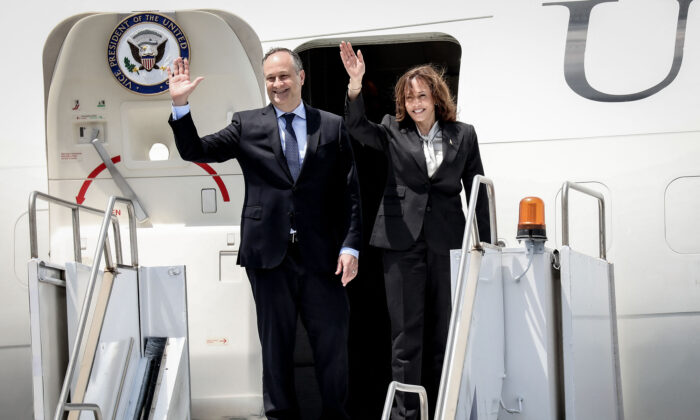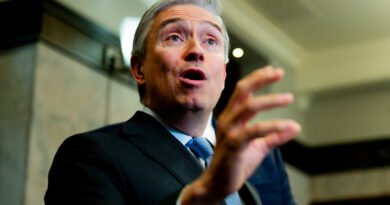Analysts Say Flagship US-Africa Trade Program at Risk Under Trump or Harris Administration
There is a strong bipartisan push to end the practice of providing ‘handouts’ to African countries with close ties to America’s biggest geopolitical adversaries.
In Johannesburg, concerns are rising among African governments regarding the possibility of the next U.S. administration, whether Democrat Kamala Harris or Republican Donald Trump, abolishing a preferential trade program that delivered 9.3 billion tax-free dollars to qualifying countries in 2023.
Enacted in 2000 by President Bill Clinton, AGOA aims at boosting weak African economies and fostering trade between the United States and African nations.
However, critics argue against financially rewarding African countries with close ties to America’s foremost geopolitical rivals, notably China, Russia, and Iran.
The Council on Foreign Relations (CFR), a Washington-based think tank, highlighted AGOA’s shortcomings in a recent analysis.
“Policymakers envisioned AGOA, the primary U.S. trade policy for the region, promoting economic and political advancement in Africa, the continent experiencing the fastest economic and population growth globally.
“However, the significant reliance on oil and apparel in African export growth questions AGOA’s ability to diversify the region’s economies and enhance competitiveness in global markets.
The future of AGOA is under review in 2025. Trump and Harris have emphasized reshoring supply chains, reducing dependence on foreign production, and safeguarding critical domestic sectors in response to the competition with China during their campaigns, according to Professor Patrick Bond, a sociologist from the University of Johannesburg.
“Both candidates are concentrating on the economy, inflation reduction, and high consumer prices in the United States,” Bond told The Epoch Times.
Trump advocates for broad tariffs on foreign-made goods to boost local production, potentially lowering food prices predominantly.
“AGOA clearly doesn’t align with that vision, which African politicians I’ve spoken to are well aware of,” Bond said.
Harris, on the other hand, intends to implement policies that retain factories and businesses within the United States, manufacturing goods for Americans.
“This approach also rejects AGOA,” Bond noted.
Ronak Gopaldas, an economic and political analyst at Signal Risk in Cape Town, expressed to The Epoch Times, “The possibility of AGOA being revoked next year is significant.”
“AGOA doesn’t align with the goals of Democrats and Republicans to enhance domestic production,” Gopaldas added.
He estimates a nearly 100 percent likelihood of Trump discontinuing AGOA due to many African beneficiaries having affiliations with China.
The historical and ideological ties of the African continent with China and Russia involve Moscow and Beijing supporting African rebels with military training, weapons, and funding.
Several African economies benefiting from AGOA are governed by administrations supportive of socialism and communism, aligning themselves with China’s Communist Party.
Major beneficiaries of AGOA, like South Africa, have entered extensive trade agreements and military collaborations with China and Russia.
Amid these circumstances, over 200 U.S. lawmakers from both political parties question the grounds for AGOA.
Risch pointed out that South Africa’s close alliances with Russia, Iran, and U.S.-designated terrorist group Hamas counter U.S. national security and foreign policy interests, suggesting that South Africa shouldn’t qualify for preferential trade with America.
Bond remarked that based on the speeches made by Trump and Harris thus far, “AGOA’s future appears precarious.”
“Observing Trump and Harris, at times, it’s challenging to discern the Republican from the Democrat. Trump advocates for policies mandating insurance firms to cover in vitro fertilization, while Harris admits her support for gun ownership,” Bond remarked.
“Both candidates are appealing to their non-traditional base of supporters, undecided voters, yet they both advocate for imposing high tariffs on imported goods and oppose free trade agreements.”
Nigerian economist Sarah Alade is convinced that the era of the U.S. providing handouts like AGOA is coming to an end, regardless of who occupies the White House in 2025.
“I believe Washington will focus on trade and infrastructure projects in Africa that are mutually beneficial to both Africa and the U.S.,” Alade shared with The Epoch Times.
“Like China, America requires strong ties with Africa due to the continent’s crucial mineral resources. However, AGOA isn’t essential for securing these mineral deals,” Alade stated.
In the future, both Democrats and Republicans are likely to favor bilateral trade pacts over extensive regional programs, according to Alade.
“Subsequently, U.S. administrations will aim to establish strategic trade, investment, and security partnerships in Africa,” Alade added.
She referenced the Biden administration’s strategic trade and investment partnership with Kenya.
“The United States views Kenya as a potential business partner, given its robust democracy in East Africa,” Alade mentioned.
“This move has lessened China’s influence in Kenya, which was previously significant,” she clarified.
Gopaldas emphasized that the election outcome will influence the future of U.S.-Africa relations.
“A Trump administration, with its ‘America First’ ideology, will likely adopt an insular approach and prioritize national interests over multilateral cooperation,” Gopaldas analyzed. “It’s doubtful that AGOA will survive under Trump.”
However, he pointed out that if Trump secures another term, the impact on Africa might not be catastrophic.
“During Trump’s tenure, Africa wasn’t a top priority for his administration. Yet, it’s worth noting his efforts to engage in trade deals with specific African nations,” Gopaldas mentioned.
“In his current campaign, Trump has linked trade to strategic alliances and would most likely engage with African nations that align with Western interests, albeit outside AGOA,” he added.
Gopaldas suggested that a Harris administration might choose to boost African economies through trade as a vital tool for long-term global stability, albeit without relying on AGOA.
“Harris could potentially revise the program to ensure economic beneficiaries pledge to combat violent extremism, instability, and economic fragility in strategically important regions to the U.S.,” Gopaldas projected.
Despite potential disparities between Democratic and Republican viewpoints on AGOA, Gopaldas noted that both are primarily guided by nationalistic motives, and the fate of AGOA will hinge on how Africa fits into America’s geopolitical and geo-economic strategies.





